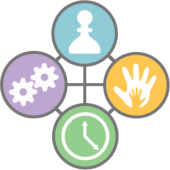
The Sustainability Education Framework for Teachers (SEFT) intends to build a capacity for educators to be able to understand: (i) the broad, complex nature of sustainability, (ii) the problem-oriented, solution driven nature of sustainability, and (iii) how sustainability connects to them as both citizens and classroom teachers. SEFT embraces four ways of thinking––futures, values, systems, and strategic which are conceptualized as being bi-directional and interconnected. The framework aids in linking sustainability topics that are seemingly disparate to the novice teacher population by building upon knowledge, skills, and attitudes necessary for problem solving with respect to complex sustainability challenges. Imagined as a conceptual framework, it offers organizing principles for examining and considering sustainability problem/solution constellations in a coherent fashion. The framework provides the opportunity for self-reflection and independent enquiry by considering and learning through real world foci. Likewise, SEFT offers a logical framework for working in interpersonal, intragroup, and intergroup situations. The four lenses require considering critical inquiries related to societal values, equity, and visions of the future; unpacking the status quo; and exploring and articulating pathways towards a sustainable tomorrow.
Continue Reading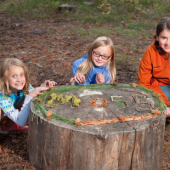
As scientific research evolves information in (K-12) curriculum can quickly become outdated. New research can greatly change the way we teach about science topics and the content we want students to understand. Educators, both formal and informal, can enrich their science curriculum by pulling from current research. Navigating the complexities and unanswered questions alongside scientists can provide a platform for discussion and insight into the nature of science and research that many students are not aware of, providing both a unique experience and valuable lesson on problem solving. Using lessons recently created in tandem with current aviation biofuels project, this article demonstrates the steps educators can take to use ongoing research to create lessons for their own audiences. As often noted in media and current events, finding a reliable, abundant, and sustainable source of transportation fuel is a high priority. One current research effort is being led by the U.S. Department of Agriculture–funded Northwest Advanced Renewables Alliance (NARA), which combines research efforts from industry and educational institutions to build a renewable supply chain for aviation biofuel. This article highlights steps suggested for educators to break down current research to create lessons for their audiences through an explanation of lessons that were developed using NARA research as a foundation. These steps include: Define the theme, Provide the background, Break down the parts, and Draw the parallels.
Continue ReadingEditing this special issue of the Journal of Sustainability Education has been a fascinating journey into how energy education can be improved, and why energy itself may be the key sustainability issue we must tackle this century. As a team, we’ve been motivated from the start by the belief that something is missing–something big–from our […]
Continue ReadingIn this program and practices feature, we describe two different models of teacher professional development designed to help teachers build their own energy literacy while gaining tools to bring energy literacy to their classrooms. Through a review of the literature we identify principles by which to compare and evaluate the two approaches. Both were successful in helping teachers to build energy literacy; each had a mix of advantages and disadvantages when compared to the literature.
Continue ReadingRenewable energy has become an important priority to the development of human society. The authors proposed an innovative “Proposing-Learning” model to improve the renewable energy education at the university level, in which the student community was extensively involved in the selection, development and assessment of a capstone project. In this project, a hybrid energy harvesting system prototype comprised of a bamboo wind turbine and solar panels was developed at the University of Vermont. The project idea was initially proposed through an online collective intelligence voting system, and then discussed in a committee comprised of students, faculty, staff and alumni members. A group of undergraduate students, representing different engineering disciplines, worked with the faculty advisors to create the prototype successfully. Good assessment was received from the students and local community for the project. Finally, the authors discussed the future effort to improve this education model and the potential applications of the hybrid renewable energy system.
Continue Reading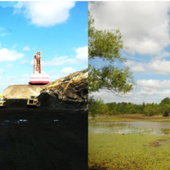
This paper describes a three-week professional development program, for inservice science teachers, which included on-site field trips to different energy production sites, explored the variety of opinions about them (via film, podcasts, news media, and expert lectures), and incorporated mathematical modeling as a lens through which to evaluate the relative sustainability of each energy type. The teacher participants explored oil, natural gas, hydroelectric, nuclear, wind, and coal energy production methods. This paper describes in detail their experience at a coal strip mine and a coal fueled power plant. For each type of energy, the teachers completed a pre- and post-assessment on their understanding of how the energy source was used to generate electricity and their perceptions of the environmental costs of each. The participants’ change in understanding of the energy production methods and increasing awareness of environmental costs are shared. Further, in their own words, participants describe the impact of the professional development on their own knowledge base and their classroom teaching as well as their perceptions of experiential learning as a vehicle for conceptual change.
Continue Reading
This study presents outcomes from the Girls Energy Conservation Corps, a research and development project that produced a series of six patch activity guides for girls age 8-14 who are members of the Girl Scouts of Eastern Massachusetts. The program focused on integrating engaging online and real world activities that involved girls in learning about climate change and their role in it, in saving energy, understanding the importance of collective goals and action to address climate change, and using new media creatively to educate peers and the community about energy conservation. Positive changes in knowledge, behavior, and attitudes pre to post suggest that a carefully designed program can address the challenges of educating children about energy conservation and climate change at this age, even if participant exposure to the program is brief. Findings also bring to light that developmental differences may be important to deconstruct in future studies when applying adult-tested behavior change models and theories to youth.
Continue Reading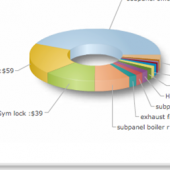
This paper will explore the Energy for ME program, funded by the Environmental Protection Agency and the National Science Foundation, which worked across formal and informal K-12 environments to bridge the gap between society, science, and the environment. Specifically, this article documents how Energy for ME integrates three experiential education pedagogies (place-based education, inquiry, and project-based learning) in combination with real-world electricity data in order to impact energy consumption within participating communities. Energy for ME schools and communities have saved over $135,000 in homeowner electricity costs, 900,000 lbs of carbon, and 1,000,000 kWh of energy) in electricity costs over the 3 years of the project.
Continue Reading
Undergraduate energy education is often offered from a specific perspective, such as engineering, sustainability, policy, or economics. This essay argues that undergraduate programs in energy should be explicitly interdisciplinary, because issues surrounding energy production, transmission, and use have multiple perspectives. Challenges to creating interdisciplinary energy programs include often-compartmentalized nature of colleges and universities, and employment prospects for broadly-educated graduates that may not be clear. Strategies for overcoming those issues are proposed, but others remain to be developed by leaders in undergraduate energy education.
Continue Reading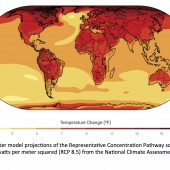
Energy education, vital though it is, remains incomplete if it doesn’t explicitly address the impacts of human activities, specifically the combustion of buried solar energy/fossil fuels, on the environment in general and climate system in particular. Projections based on current emission trends indicate a likely increase of the radiative forcing of energy in the Earth system from around three waters per meter squared today to over eight by the year 2100, substantially heating the planet in the process. Efforts to avoid or minimize the connection between human energy consumption and changing climate amount to a form of science denial through omission. In order to address the causes, effects, and risks of climate change and appreciate the range of options to minimize negative impacts and maximize resilience, energy and climate literacy efforts should be combined and ideally infused throughout the curriculum.
Continue ReadingEat local. Choose a reusable bag instead of plastic. Put a brick in the toilet. These are intuitively simplistic environmental “solutions” that may do little but make a person feel environmentally virtuous. Energy and environmental science teaching requires us to change students’ preconceived simplistic notions about solving environmental issues if we want these future leaders to make real environmentally effective decisions. Students need to understand that the energy input in a disposable plastic bag is dwarfed by the energy expenditure of driving to the grocery store with a reusable bag, so that they don’t make symbolic, but ineffective decisions. One approach is to have students attempt to develop a “sustainable” product. The complexity of environmental solutions becomes evident when we have to evaluate the energy use and environmental consequences from raw material sourcing to reuse.
Continue Reading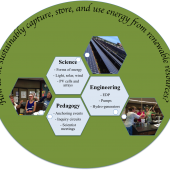
In August 2014, twenty-nine K-8 teachers from eleven Vermont schools engaged in the science, engineering and pedagogical practices of sustainable energy education. This week long workshop was organized by the Vermont Science Initiative (VSI), with an engineering and science instructor each from Norwich University and Lyndon State College respectively, and in partnership with the Vermont Energy Education Program (VEEP).
Teachers defined energy in terms of work, differentiated between transfers and transformations occurring across different energy forms, and gained a deeper conceptual understanding of renewable and nonrenewable energy sources. Opportunities for inquiry ranged from wind turbines, to electrical circuits, to light and Photovoltaic (PV) cells, and an energy bike. These, in combination with scientist meetings and a field trip to a nearby solar PV farm solidified their scientific literacy in the sustainable energy context. The teachers were also led through the Engineering Design Process (EDP) including concepts of design criteria and constraints to learn about sustainably engineering the energy components of systems. Teachers worked in groups to build an Archimedes Screw pump and determined the efficiency of a micro-hydro-generator. By the end of the week, post assessment test results revealed that the teachers had a 37% improvement in understanding various content areas.
By engaging elementary and middle school teachers in fun, hands-on exploration of sustainable energy we hope to bring this form of literacy to our youngest citizens, and future leaders and decision makers. The opportunity to continue engagement throughout the year with three follow-up sessions, and a forum to share the units they developed and best practices through the VT Agency of Education website will serve as a model for other stakeholders interested in implementing a similar program.
Continue Reading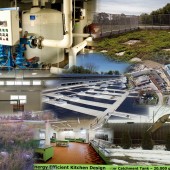
Many K-12 school districts are embracing energy conservation efforts and constructing environmentally sustainable buildings with the purpose of lower operating costs of their facilities. Investments in green infrastructure to improve operating efficiencies and occupant health are important but the impact on green buildings on instructional practice should also be considered. This study focused on teachers’ perceptions of the many impacts of a new sustainably designed middle school on students and teachers and explores the use of the school as a learning laboratory. Grades 6-8 teachers participated in open-ended focus group discussions near the end of the first school year in their new green building. An emergent coding framework was created to characterize conversation topics. Analysis of the coding yielded insights into seven major categories of teachers’ perceptions of the impact of the new green school on their work in the building and their students’ attitudes and academic performance. The seven major coding categories of green infrastructure, student behavior, student awareness, teacher awareness, curriculum, health, and professional development were further analyzed to formulate considerations and recommendations for others to capitalize on the instructional potential of sustainably designed school facilities as learning laboratories.
Continue Reading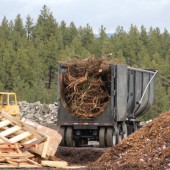
The Northwest Advanced Renewables Alliance (NARA) is a biofuel research project that includes a holistic educational approach to energy literacy. NARA research is focused on woody biomass as a feedstock for biofuels and associated co-products, particularly in the forested areas of the U.S. Pacific Northwest. Extending beyond the science of biofuels, the NARA project examines many social elements of our energy economy, including education. Projects that can combine research and connections to educational venues provide excellent opportunities to expand the impact of grant funded proposals. Keys to making this possible include coordination across disciplines, interpretation of research results, and research processes in the field coupled with investment into integrated educational strategies within the project. This paper outlines elements of the NARA approach to energy literacy, offering strategies for approaches to broader impacts in projects beyond the energy sector.
Continue Reading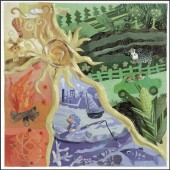
Effective teacher professional development in energy education is essential to creating a sustainable future. This article highlights and describes three key components of the Wisconsin K-12 Energy Education Program (KEEP) that have led to two decades of increased statewide energy literacy. The success of the program can be attributed to supportive partnerships that guide staff, the development of an adaptive conceptual framework, and a professional development network for teachers. We offer these components as a guide for other energy education programs to promote future successes in teacher professional development in energy education.
Continue Reading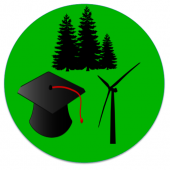
Linking ecology and energy literacy efforts is an essential step for producing scientifically literate citizens who are able to make informed choices about energy, yet the two literacies have developed independently. To explicitly link these, we explored the interface between ecology, energy and education by inviting experts from diverse fields to share perspectives on how to improve public literacy in ecology and energy. This paper presents a synthesis of three organized sessions at the Ecological Society of America (ESA) August 2014 annual meeting: a symposium on a broad range of issues related to energy, ecology and sustainability; an organized oral featuring innovative approaches using ecological concepts to educate Kindergarten through college students about energy, and a share-fair where these innovations were demonstrated. Presentations represented all age-levels, non-formal and formal education, the geophysical sciences, public policy experts, government agencies, ecologists and sociologists, faith-based and environmental non-profits.
Diverse, creative and innovative educational approaches are underway, with major government funding attesting to their import. For ecologists, most of the energy applications centered on sustainability issues, and focused on climate change caused by fossil fuel development. Emerging considerations include direct impacts of energy development and transmission on ecosystems. Conversely, energy literacies should consider the role of ecology, given the ecological impacts involved in decisions about energy extraction and transport. General public audiences including environmental, faith-based and environmental justice communities are increasingly considering environmental dimensions in energy decisions and policy outreach but often on single, time-sensitive issues. Adult education would benefit from a more comprehensive integration of energy and ecology.
We propose that including an explicit ecology dimension in the energy literacies, and similarly involving energy application in the ecology literacies, would be synergistic and allow these inclusive and inherently interdisciplinary fields to flourish and best serve our educational goals of achieving an informed citizenry.
Continue Reading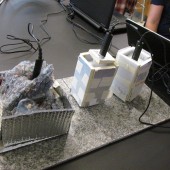
Columbia Water & Light is a municipal electric and water utility with a number of energy education programs. By hiring a full-time education and outreach coordinator, Water & Light has been able to create connections with existing audiences in the community. Historical and current programs have earned awards for the utility. Water & Light’s education programs touch on the science, math and social forces behind energy in the community through projects with adults and children alike. By addressing energy education from a number of angles, Water & Light hopes to provide the community a holistic view of their energy use and how they can improve, with a goal of increasing participation in the utility’s efficiency programs. Short descriptions of a number of programs highlight the work that Water & Light’s education and outreach team has developed over a number of years.
Continue Reading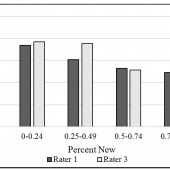
National efforts in energy education aim to increase energy literacy and a diverse set of tools is needed to assess the effectiveness of different educational endeavors. As an alternative to the standard testing-based approach for determining individual energy knowledge, this research further advances a rubric-based approach for assessing the energy literacy manifested in artifacts of a competition or project. The goals were to add additional validity, determine if revisions to the rubric and assessment process increased reliability over the initial study on abstracts, and to determine how well suited the approach is for application to posters – the final deliverable of the competition. The rubric was applied to abstracts and posters from Imagine Tomorrow, a high school energy competition, and the resulting scores were analyzed for both standard rater reliability measures and variable-linked trends. Results showed that interrater reliability on the abstract assessment was similar to that of the previous study, the poster assessment showed much higher reliability than the abstract assessment, and many of the same energy literacy trends identified in the previous research were present with additional data allowing for further trend investigation in this study. While this refinement did not appear to contribute to higher reliability, it has created a rubric that is more user friendly and valid. This study has preliminarily demonstrated that the rubric approach may be more appropriate for artifacts with more information, such as posters or reports, than for brief summaries, such as abstracts. In the posters, some trends based on competition variables were able to be identified. This constitutes the next step toward an implementable approach that has the potential to assess certain energy education endeavors.
Continue Reading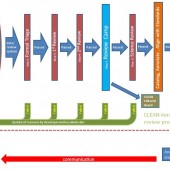
Recent changes in the climate system are mostly due to greenhouse gas emissions through increased energy use by society, which changes the distribution of energy in the Earth system. These changes highlight the importance of energy education. Energy consumption is at the source of and the solution to climate change. However, studies across the US and globally show that students’ understanding of energy and the connection between energy and climate is low. The Climate Literacy and Energy Awareness (CLEAN, http://cleanet.org) effort supports educators of middle school through undergraduate levels in their teaching about energy topics by providing an online, free collection of peer-reviewed, classroom ready resources that span the entire breadth of energy and climate education. The web portal also provides materials for teachers to learn more about how to teach about energy and climate. A vibrant community supports educators and other stakeholders in their efforts.
Continue ReadingReimagining energy education involves moving beyond the basics of energy use, conservation, and efficiency toward a more robust exploration of energy. This exploration should address energy access and equity, the impacts of energy choices, and personal attitudes, beliefs, and behaviors related to sustainable energy solutions. One approach to encourage this evolution is to use a learning context that inspires educators and students to delve deeply and methodically into the social, economic, and environmental interconnections of energy issues—in other words, to learn about energy within the context of global sustainability. In this article, we share Facing the Future’s definition of global sustainability education (GSE), explain why GSE is an effective context for energy education, and use Facing the Future’s newest energy curriculum to demonstrate how GSE can be employed to develop engaging and rigorous interdisciplinary energy curriculum.
Continue Reading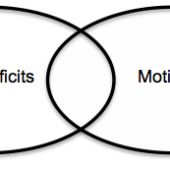
Why don’t people adopt energy efficient appliances and curtail their behaviors to decrease energy use? People may not know which behaviors are truly effective and may be insufficiently motivated to change their behaviors. We focus on one area of this problem by first analyzing existing decision aids, tools available to help users make effective decisions. We explore EPA’s Energy Star program, DoE’s EERE calculators, and LBNL’s Home Energy Saver tool. We highlight their strengths and limitations and propose a framework to expand the functionality and uptake of the information through such aids. We suggest improvements along two broad areas. One area concerns the analytic capabilities and the information content of the decision aid, which focuses on (1) multiple goals and constraints, (2) hidden costs, and (3) heterogeneity in user characteristics. The other pertains to the framing so that users can easily process information through decision architecture by limiting choice overload and incorporating smart default options.
Continue Reading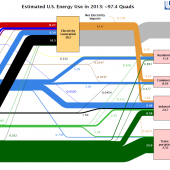
Energy services undergird all modern, industrial societies, yet economies based on fossil fuels are not sustainable. Insecurity of supply, particularly of oil, has sparked major geopolitical tensions and warfare. Pollution from use of fossil fuels and other energy sources has damaged local, regional, and global health. Greenhouse gases from fossil fuels have triggered concerns about the earth’s climate. Educational institutions are responding only slowly to these existential threats. This paper addresses the challenges facing students, faculty, and administrators as institutions move from simply providing technical education on the respective components of the energy industries to a more comprehensive program that also addresses the environmental, political, economic, cultural, and ethical contexts of energy literacy. Students at most institutions lack courses and programs outside of engineering and physical science. Only 8 percent of 1638 institutions have systematic, broad-based energy studies. The U.S. Department of Energy has supported initial efforts to develop this field. Development includes helping students move from energy studies to employment. Nevertheless, student interest is high. Faculty teaching sustainable energy have generally self-taught, and faculty employment opportunities in energy studies seldom exist. A faulty member delivering energy studies generally lacks a community of supporting peers. Those in this interdisciplinary field may fear the effort will not be rewarded by the institution. Nevertheless the intellectual rewards from developing energy studies are significant and motivating. Administrators face questions of balancing competing claims for institutional resources and face criticism from internal and external constituencies. In addition, they must guide the institution to promoting, enabling, and rewarding interdisciplinary work. Development of energy studies, however, positions the institution for better internal operations and for meeting critical societal needs. We conclude that energy education is both easy and hard, but it can and must be done.
Continue Reading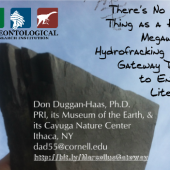
Prezi presentation on overall energy picture in the U.S. and the role of hydrofracking with special focus on the Marcellus Shale
Continue Reading